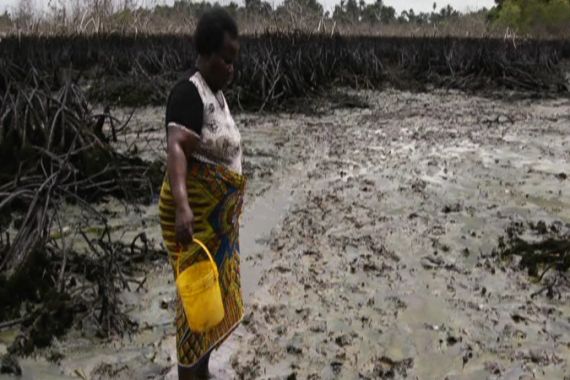Nigeria: Supreme Court upholds status quo on Shell asset freezing
The Niger Delta, the source of crude in Africa’s largest producer, is a poverty-stricken region where life expectancy is 10 years lower than the national average.

Nigeria’s Supreme Court has stayed proceedings on a lower court’s decision halting oil major Shell from selling its assets in Nigeria until a dispute over a 2019 oil spill is resolved between the company and a community in the oil-rich Niger Delta.
In March, a high court had barred Shell from any asset sale in Nigeria until a decision is reached on the dispute. Eighty-eight communities in Rivers State were awarded $1.95bn compensation for an oil spill they blamed on Shell and which damaged their farms and waterways.
Keep reading
list of 4 itemsEnergy industry methane emissions rise close to record in 2023
What’s slowing down America’s clean energy transition? It’s not the cost
Global coal use to reach record high in 2023, energy agency says
Shell, which denied causing the spill, appealed the compensation verdict and the ruling blocking the sale of its assets. The company then went on to advertise for bids for the assets after filing an appeal.
But the Supreme Court, in a ruling dated June 16, said the parties should “maintain the status quo” until a hearing of all applications from Shell and the communities later this year.
“What the status quo means here is that there should be no bids, no sales until the hearing of the applications which has been fixed for November 3, 2022,” Mohammed Ndarani, the lawyer representing the Delta communities, told Reuters on Monday.
Gbenga Odugbesan, a spokesperson for Shell Nigeria told Al Jazeera that the company was encouraged by the ruling. “We have a strong belief in the merit of our case and in the rule of law. Nigeria remains an important heartland for Shell. We will continue to invest in the country to help meet its energy needs, with a focus to grow our deep water and gas positions, while exercising our rights under the law.”
The delta, the source of crude in Africa’s largest producer, is a poverty-stricken region, where life expectancy is 10 years lower than the national average. Residents have become accustomed to decades of spills, gas flares and other issues like coastal erosion.
Shell wants to sell its stake in Nigeria’s onshore fields, where it has been active since the 1930s, as part of a global drive to reduce its carbon emissions.
The company, the most significant international oil major operating in Nigeria, has faced a string of court cases in the past over oil spills.
In April, Shell said the volume of crude oil spills caused by sabotage in the delta more than doubled to 3,300 tonnes last year, a level last seen in 2016.